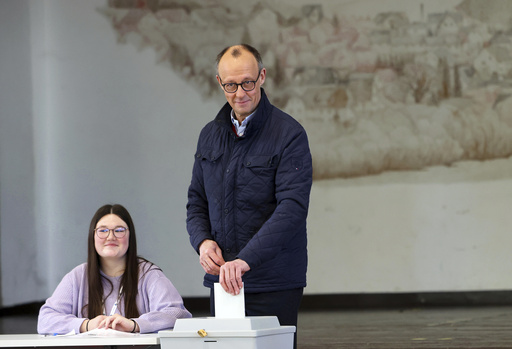German citizens participated in the election held on Sunday, with preliminary exit poll results indicating that Conservative leader Friedrich Merz is leading the way. Moreover, the far-right party Alternative for Germany (AfD) appears poised to achieve its best performance in the post-war era. The election unfolded against a backdrop of challenges, including the implications of the new Trump administration, the ongoing Russia-Ukraine conflict, and overarching security concerns across Europe.
According to exit polls released by ARD and ZDF public broadcasters, Chancellor Olaf Scholz’s Social Democrats, a center-left party, are anticipated to experience their worst election outcome since World War II, possibly finishing in third place. Issues such as the stagnation of Germany’s economy, the need to manage migration, and the uncertain future of Ukraine and European relations with the United States were central themes during the campaign.
Polling stations across the nation closed at 6 p.m. local time, with exit polls expected to be published immediately afterward. Candidates for chancellor were likely to address their supporters at various party gatherings throughout the country.
Voting in Berlin took place in a range of conventional locations like schools and community centers, alongside some unusual venues such as car dealerships, restaurants, and pubs. Approximately 2.43 million people in the city were eligible to cast their votes.
In Munich, officials were preparing to handle postal ballots, with the counting process scheduled to commence after polling stations closed. By 2 p.m. local time, voter turnout was reported at 52%, a significant increase compared to 36.5% during the 2021 election at the same time. This figure does not account for those who voted by mail. Historical data shows that Germany typically sees high voter engagement; the final turnout for the last national election was 76.4%.
The governing coalition led by Chancellor Olaf Scholz brought together the Social Democrats, Greens, and Free Democrats, often referred to as the “traffic light” coalition due to their party colors of red, green, and yellow. In the current election, the parties are represented by colors: black for the Union bloc, red for the Social Democrats, green for the Greens, yellow for the Free Democrats, and blue for the AfD. Possible new government formations could include a “Kenya” coalition comprising the Union bloc, Social Democrats, and Greens, or a “Germany” coalition involving the Union bloc, Social Democrats, and Free Democrats.
With over 500,000 newly naturalized citizens eligible to vote, a significant portion of these new voters hail from Syria. Many fled conflict and instability in their homeland over the past decade, notably during the migration surge of 2015-2016. For these new citizens, participating in the electoral process in Germany holds profound importance, especially those who escaped civil turmoil as they search for a more democratic future back home.
The timeline for forming a new government remains uncertain, as there are no formal procedures or deadlines in place. Friedrich Merz hopes to establish a new government by mid-April if his party secures victory. In the meantime, Chancellor Scholz’s current administration will continue to function in a caretaker capacity until a new chancellor is elected by the Bundestag.
Mainstream German parties have taken a firm stance against collaborating with far-right factions, often referencing a “firewall” established to protect democracy. This includes a rejection of any cooperation with the AfD in the election. Comments made by U.S. Vice President JD Vance about eliminating such barriers received backlash from German political leaders.
The AfD has an established history of gaining support from voters concerned about a range of issues, including migration policies and the shift away from fossil fuels. Its rise has underscored broader discontent with governance and policy decisions. Uli Hoeness, a significant figure at Bayern Munich, shared that he would confront players who might support far-right parties, reiterating the club’s commitment to tackling racism.
Germany’s next governing body will significantly influence the continent’s stance in response to various geopolitical issues, especially in relation to the U.S. administration. Merz has committed to rejuvenating the economy and safeguarding European interests amidst complex international challenges.
Polling stations opened from 8 a.m. to 6 p.m. local time, allowing approximately 59.2 million eligible voters, including around 2.3 million first-time voters, to participate. Following the closure of polls, exit polls would be unveiled, and vote counting was set to commence, with final official results anticipated early the following day.
In this election, four prominent candidates are competing for Germany’s leadership: incumbent Chancellor Olaf Scholz, opposition leader Friedrich Merz, Vice Chancellor and Greens candidate Robert Habeck, and the AfD’s Alice Weidel. This election was necessitated by the collapse of Chancellor Scholz’s coalition government in early November, marking only the fourth time in Germany’s history that parliament was dissolved ahead of schedule under the post-war constitution.




